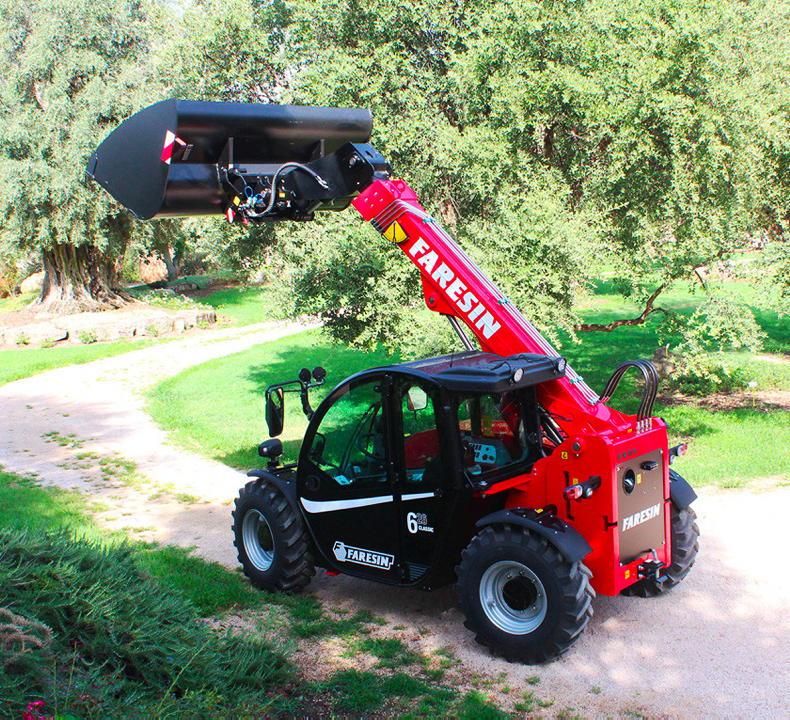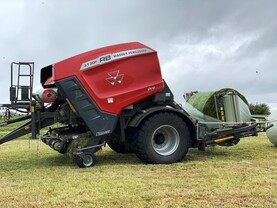Ballymahon-based Gerety Farm Machinery has begun importing the range of Faresin telehandlers.
The Longford dealership recently took delivery of the first units.
Faresin is an Italian company that manufactures a range of agricultural and construction telehandlers with lifting capacities from 2.6t up to 6.4t, with a range of lifting heights from 5.9m right up to 16.4m.
Engines and transmission
The firm uses a range of Yanmar and Deutz engines, hydrostatic and CVT transmission, Dana Spicer axles and Bosch Rexroth hydraulics.
The Faresin franchise will join the other brands which Gerety currently retails including Kuhn, Rauch, NC, Mastek and Tuffmac.
Causes
We spoke to Mike Curtin from Coen Steel in Galway, who would supply a number of Irish manufacturers, to get a feel for the ongoing situation.
“There is a lot of turmoil in the steel industry right now, most notably around price and availability. The cost of raw materials worldwide such as iron ore has gone up in price and mining mills don’t seem to have the capacity to meet demand,” he explained.
“COVID-19 restrictions mean many of these mills are working at 60-70% capacity which is having a major effect on supply. China is importing major amounts of steel for infrastructure projects taking place within the country which is also snapping up supply.”
“Since December alone, we have seen the price of some steels jump by up to 30%. Shipping times are becoming a major issue for everyone. Typically, we work off a shipping time of four to six weeks. However, this has recently been pushed out from six to 10 weeks. Many mills we buy off throughout Europe are adding price hikes twice weekly, with some not guaranteeing delivery and more refusing to quote.”
“The last time I saw anything like this was in 2007 when the construction industry was at its peak. Current demand is nowhere near that today. The problem seems to lie in reduced capacity at mining mills due to COVID-19. It will be a challenging time for manufacturers who aren’t carrying much stock on the ground.”
Meanwhile, other steel suppliers are saying Brexit is also having an effect on the price of steel locally. Import licences and customs clearances are adding to the administration process for exporters sending steel from the UK, bringing additional associated costs. Freight costs of road transport have also risen due to the added complications and delays through the ports.
Scrap is on the rise
Alongside raw material price increases, scrap steel prices are also on the up. A major steel supplier has noted the recovery of world steel production, reduced availability of automotive scrap and difficulties of scrap collection are all likely to be contributing factors.
The supplier noted we will probably discover the increase is largely attributed to heavy Chinese scrap buying. It is widely reported that the Chinese are making moves towards more environmentally friendly steelmaking which is basically scrap melting. To encourage this process, scrap in China has been redefined from just waste scrap to waste scrap and recycling scrap where the latter carries no duty from 1 January 2021.
Safeguard measures
This news comes seven months after the European Commission published the result of its second investigation reviewing the initial safeguard measures it put in place on steel imports in July 2018.
This package was put in place to defend the European steel industry in the current difficult market situation. The changes were to ensure that the gradual resumption of activity and return to normality takes place in an orderly manner.
Adjustments were made in managing quotas to deter potentially harmful stockpiling by foreign exporters trying to sell large amounts of steel in the EU market in an opportunistic manner to the detriment of the EU steel industry. However, the comment on the ground is that demand seems to be currently outweighing supply.
Components
Some manufacturers who have ordered components recently have noted a reduced capacity of available supply. A combination of the shutdown and reduced working capacity of factories due to COVID-19 and massive delays in custom clearance from the UK due to Brexit is being blamed.
One manufacturer explained: “Some component suppliers on the continent are robbing Peter to pay Paul. They seem to be working off a limited supply and are trying to almost ration the available supply. It’s becoming an issue for finishing machines. The component shortage is ranging from LED lights to bolts”.
Over the past three months, shipping costs from China where many components are sourced has also seen a significant price increase, due to a shortage of containers. However, it’s understood this is forecasted to ease in the near future.






 This is a subscriber-only article
This is a subscriber-only article










SHARING OPTIONS: